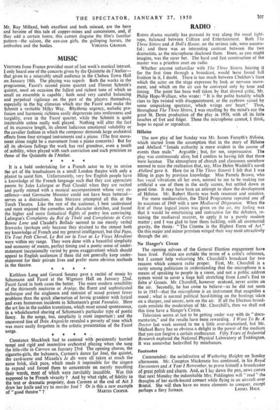Haoise The new play of last Sunday was Mr. James
Forsyth's Heloise, which started from the assumption that in the story of 'Laois. and Abelard "female authority is more evident in the course of events than male." Arguable ; but, for me, unpersuasive. The play was continuously alive, but I confess to having felt that there were lacunae. The atmosphere of church and classroom somehow seemed to miss the realisation that, say, Miss Helen Waddell's novel A belard gave it. Here (as in The Three Sisters) I felt that I was filling in gaps by previous knowledge. Miss Pamela Brown, who has vocal vibrations all her own, seemed to me to be making too artificial a use of them in the early scenes, but settled down in good time. It may have been an attempt to show the development of Heloise. Mr. Robert Harris was both resonant and sensitive.
For more mediaevalism, the Third Programme repeated one of its successes of 1949 with a new Mediaeval Disputaton. When the first of these logical jousts was given on the air, my feeling was that it would be entertaining and instructive for the debaters, re- taining the mediaeval manner, to apply it to a purely modern matter ; and I was glad to hear them tickling, with all ceremonial gravity, the thesis: "The Cinema is the Highest Form of Art." On this major and minor premises winged their way most attractively through the air.










































 Previous page
Previous page